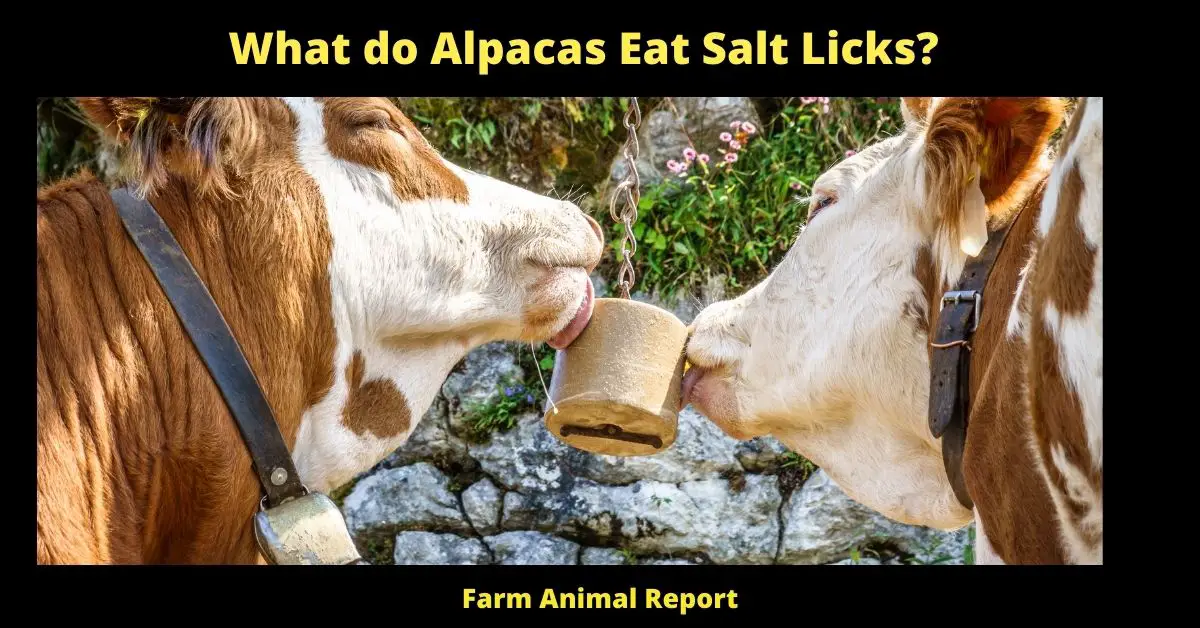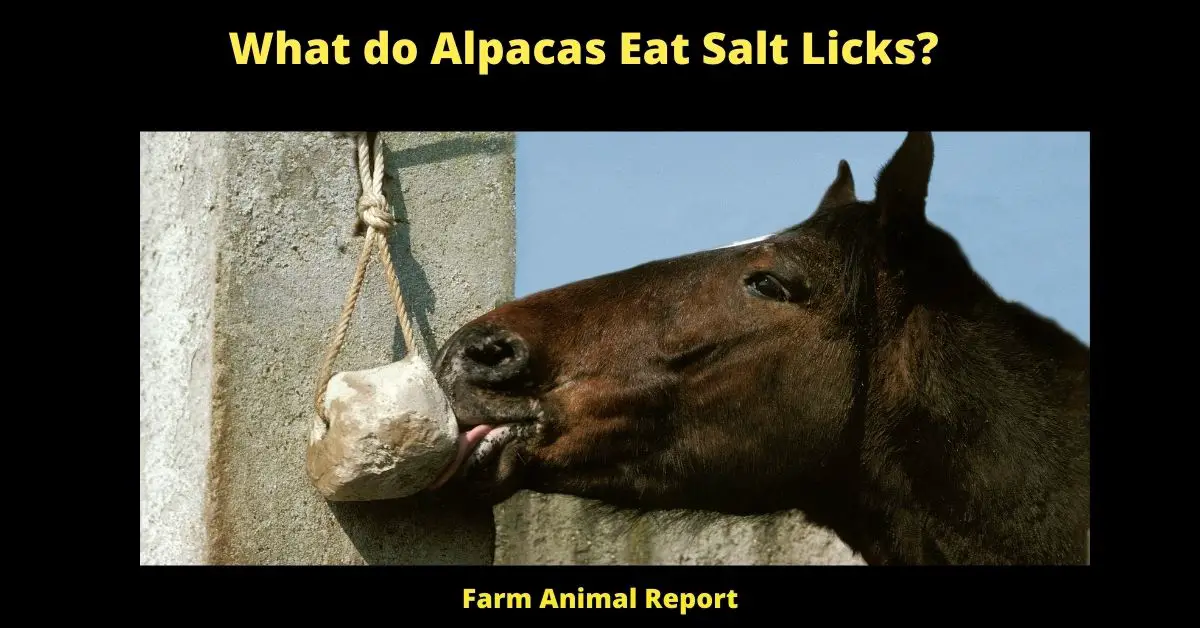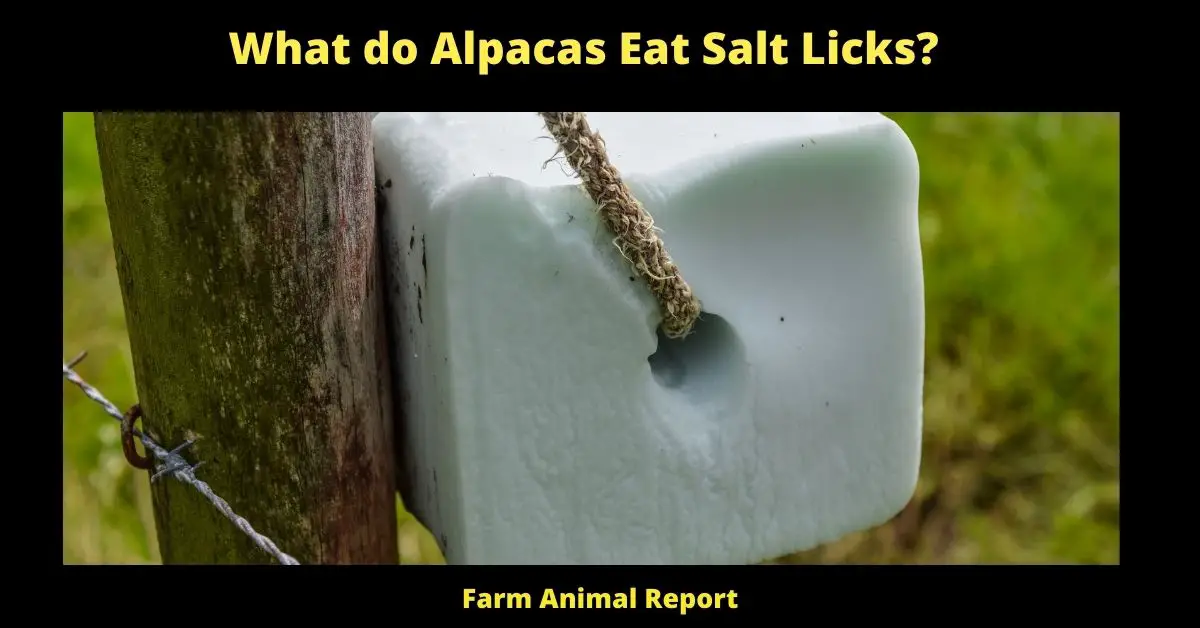Salt licks are often given to animals as supplements or for environmental enrichment purposes. Salt is an essential nutrient that helps control fluid balance in the body so it’s important for all animals including Alpacas!
What do Alpacas Eat Salt Licks?
Alpacas are a type of domesticated camelid that lives in South America. Alpacas eat mostly grasses, hay, straw, corn silage, and alfalfa pellets to balance their diet.
Jump to 18 ways Alpaca Farmers make Money
Alpacas are herbivores and eat grasses, leaves, flowers, and hay.
They need a salt lick to provide them with the sodium and other minerals they don’t get from their diet.
They will also enjoy some fruit treats such as apple chunks or half an orange once in a while, although too much sugar is not good for them. Alpacas like most animals can eat small amounts of raisins and grapes without problems.
Alfalfa hay is a good source of calcium for lactating females and growing crias (baby alpacas). Young animals should have access to unlimited grass hay.
Salt licks can be purchased at most farm stores or online. Be sure to get a lick that is designed for horses or cattle, as these animals need more salt than alpacas.
You can also make your own salt lick by mixing one part of table salt with nine parts of feed-grade limestone. Be sure to store the lick in a moisture-free container.

Salt licks are an important part of an alpaca’s diet and should always be available to them. Alpacas will usually find and chew on the lick given to them, but if they don’t seem to be interested you can put it in a place where they cannot reach it. Be sure to get a lick that is designed for horses or cattle, as these animals need more salt than alpacas. What do Alpacas Eat Salt Licks?
Why Is salt important in the Alpacas diet?
Alpacas are grass eaters, and their bodies need salt to keep the electrolyte balance.
Alpaca Salt Licks are a daily routine in many alpaca farms around Australia. The requirement for extra minerals isn’t only limited to adult animals but also to young ones too.
The lick is placed in an easily accessible spot, and the alpacas will come over to lick it as they need. Some producers also put little molasses on the salt licks to make them more appealing to the animals.
A lack of minerals can cause problems such as joint stiffness, reduced fertility, and milk production, hair loss, lower milk protein, and the inability to control body temperature.
Camelids’ digestive system is adapted for dealing with low levels of sodium in their diets compared to other animals; therefore it doesn’t need large amounts of salt (unlike horses or cattle). For this reason, some producers choose not to offer salt licks on a regular basis, but to monitor the animals and only top up when they show signs of deficiency.
Alpacas have a high requirement for selenium and copper, so many producers include these minerals in their salt lick formulations.
Alpacas need water every day to stay hydrated.
They drink from a bucket or water trough. Alpacas eat hay and grass, but they also need salt licks to help them get the nutrients that they can’t get in their regular diet. Salt is not just found in our homes at the kitchen table! Alpacas have specific needs for minerals such as calcium, iodine
Salt licks are a form of salt that alpacas lick from the ground or from blocks of salt placed in front of them.
Kirkton Salt Licks are made from pure salt and clay, which is very important to the health of your alpacas.
There are also some different types of salt licks block or ball form. Ball lick blocks come in a variety of sizes and shapes – round balls, square blocks, heart-shaped chunks! Block licks are usually larger and last a lot longer than ball licks.
Some people like to make their own salt lick blocks by using a 50-50 mix of salt and clay, but it is very important that the salt you use is pure or your alpacas could get sick.
The amount of salt an alpaca needs depends on how much it is eating each day as well as its size.
The amount of salt an adult alpaca needs each day is about a tablespoon, while a baby alpaca only needs about one-half teaspoon per day.
Alpacas will lick salt licks to get their daily dose of sodium. However, if there is an ample supply of hay and other vegetation in the animal’s diet, it probably won’t need as much salt.
A salt lick is a great way to provide extra minerals and vitamins to your alpacas, especially if they are not getting enough from their food. You can also use it to help cure an animal that has been sick or stop them from becoming ill.
If you notice your alpaca’s urine becoming more concentrated than usual or if it has stopped drinking water altogether, consult a veterinarian for advice.
A bright yellow or orange color to the urine may be a sign of too much salt in the diet.
Salt licks are available at most farm stores, but it is important not to give your alpaca too much salt. Too much salt can cause health problems like dehydration and intestinal blockages. Alpacas also enjoy getting their minerals from fresh fruits and vegetables, so feed them a diet rich in these foods.

Alpacas also eat hay and grass during the summer months, but you should still consider giving your alpaca a salt lick to supplement their diets with minerals they may be missing out on from grazing alone.
Final Thoughts – What do Alpacas Eat Salt Licks?
In Conclusion, alpacas need salt licks to help them get the nutrients that they can’t get in their regular diet. Salt is not just found in our homes at the kitchen table! Alpacas have specific needs for minerals such as calcium, iodine
Salt licks come in a variety of sizes and shapes – round balls, square blocks, heart-shaped chunks! Block licks are usually larger and last a lot longer than ball licks.


